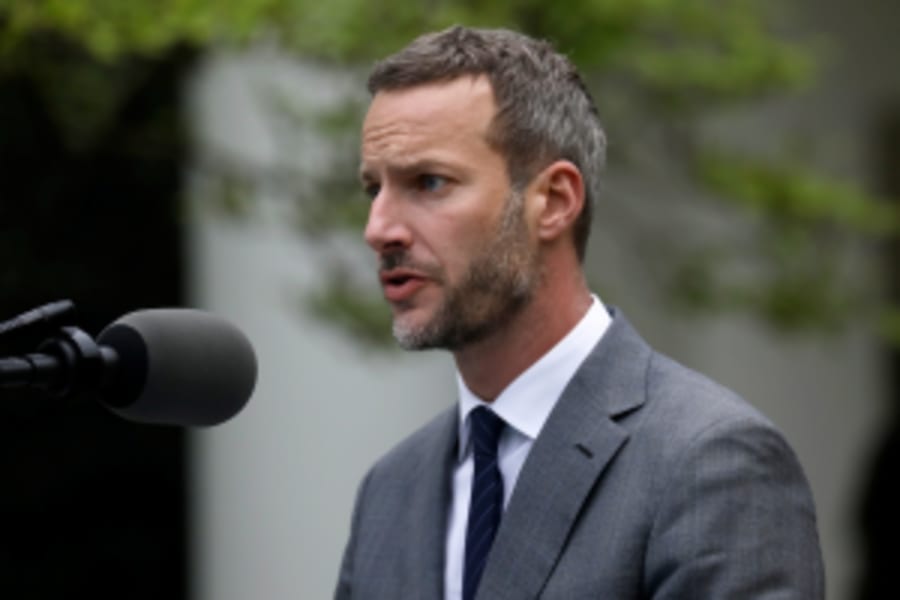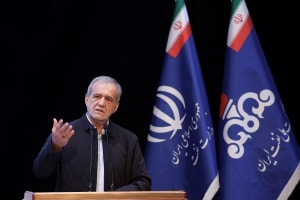US ally and Hamas terrorists’ main sponsor – how Qatar made itself indispensable in Middle East politics
Qatar expert explains motivations for opaque Gulf Emirate
Once upon a time in the 1970s, Qatar was a small backwater country, a former British stopover port ruled by the region’s youngest and least significant royal clan. Those times are long gone.
Today Qatar is a global powerhouse that managed to turn itself into a major U.S. ally while simultaneously continuing excellent relations with the Iranian Mullah regime and the murderous Hamas terrorists.
Ariel Admoni is a Ph.D. candidate at Bar Ilan University in Ramat Gan and has emerged as one of Israel’s foremost experts on the opaque Gulf emirate over the past months. In an interview with ALL ISRAEL NEWS, he attempted to explain the incredible rise of the country and its rulers’ motivations behind it.
In the first decades after it gained independence from Great Britain, the emirate was in the shadow of its neighbors, especially the Kingdom of Saudi Arabia.
“Qatar was always the sister that nobody cared about, and one scholar once said that before 1995, Qatar had no foreign policy at all. That’s not true, of course, but still a decent example of the attitude toward the Qataris,” Admoni said.
The meteoric rise to power began with the father of the current emir of Qatar, Sheikh Hamad bin Khalifa, who took power by overthrowing his father and kickstarted wide-ranging reforms and ambitious projects over the 1990s.
A crucial factor was the discovery of natural gas in 1990, giving the emirate the financial means to pursue projects like opening Al-Jazeera, which would become the biggest news channel in the Arab World and Qatar Airways.
That same decade, the kingdom received a crucial break when extremists made hosting the large U.S. base in Saudi Arabia increasingly problematic for its leadership.
Qatar’s emir jumped at the chance to host the world’s superpower in his country and invested almost $1 billion in the construction of what became the largest U.S. base in the Middle East, in effect, creating an impenetrable shield for his regime.
“So it was luck and good politics in the same decade,” Admoni summed up. “Sheikh Hamad transformed the country to be much more liberal than in the past, much more connected to the U.S. than in the past, much more intertwined in business ventures.”
Qatar continued this policy of insinuating itself with the West through diplomacy, business, sports, and strategic investments like becoming the largest foreign donor to American universities over the last two decades.
What makes the Qatari approach so unique, however, is its parallel policy of ingratiating itself with the West’s enemies, including Iran’s “Axis of Resistance” and its terror militias, the Afghan Taliban, as well as the Palestinians.
Qatar’s connection to the Palestinians is an example of par excellence in its policy that seeks to maximize its own benefit, standing and influence above all else.
The relationship began on an individual level in the 1950s, when migrants started working in the Gulf states’ oil and gas industry – among them being today’s PA President, Mahmud Abbas.
With the Palestinian issue becoming the most critical issue on the “Arab street,” Qatar increasingly used its existing connections to its benefit.
“As long as [Qatar] maintained good relations with the Palestinians, they were also on good terms with the Arab world. Even when Qatar maintained diplomatic relations with Israel with a trade mission from 1996 to 2009. The reason that Qatar provided for this action was: ‘This is a way to promote connection with the Palestinians’,” Admoni said.
According to him, the relations with the Palestinians always combined the connection to the Palestinian ex-pats in Qatar, with the attempt to improve its standing in the Arab World.
This is also true for the current situation, Admoni noted. Despite the exhaustive coverage of Qatar’s role as Hamas’ main sponsor, Qatar aims to be seen as the “Guardian of the Palestinians,” not just of Hamas.
“Two years ago, Qatar donated a third of its humanitarian assistance to Gaza, but the major part of the assistance went to the Palestinian Authority. So I don't think that they neglect the Palestinian Authority. I think that with the Palestinian Authority, they weren’t alone.”
According to Admoni, Qatar’s special attention to Hamas is based on the fact that its exclusive relations with the terror group give it a unique ability to use it to its advantage.
One example of this is a revelation by former Qatari Prime Minister Hamad bin Jasim, who said that Qatar pushed Hamas to take part in the 2006 Palestinian elections despite its Islamist ideology. The terror group’s win in the elections directly led to its violent takeover of the enclave the following year.
The Qatari explanation was that it thought Hamas would become less extremist by taking part in the political process, but Admoni isn’t buying it. “It’s probably because they always want the movements that have connections on the ground. Qatar doesn’t want a movement that is mainly corrupt politicians.”
Whether it’s a liberal movement or an Islamist terror group, Qatar seeks influence over groups representing the majority of the people, by betting on the “sure horse.”
On this point, Admoni doesn’t agree with many other experts who see Qatar as ideologically inclined to back Islamist movements, with the thinking being that Qatar’s leadership must, itself, hold Islamist convictions.
“I argue that the Qatari approach is not Islamist. I think it’s a cynical use rather than affinity or an ideology. I think that in many instances, Qatar made moves domestically, as well as in foreign relations, that were against Islamist code,” Admoni noted.
Examples are the many concessions Qatar’s regime made during the recent soccer World Cup, like allowing alcohol consumption, which was very unpopular. Admoni also gave the example of the side-lining of the elder brother of the current Emir, who was prevented from taking the throne for being too religious.
That same dynamic holds true for Qatar’s good relations with Iran, Admoni said. Last summer, the U.S. and Iran reached an agreement for Iran to release five Americans in exchange for several billions of dollars in frozen Iranian assets.
Qatar was supposed to transfer the funds to Iran but decided to pause the deal and hold the funds, because in the changed situation after Oct. 7, appeasing the Americans was more important than keeping Iran satisfied.
“So I don’t think there is any country – any country – that Qatar will go all the way for, even the U.S.,” Admoni summed up. “Qatar, even in this issue, will not be a total friend of anyone.”
So what does this mean for Israel, and the possibility to sway Qatar to help release Israeli hostages held by Hamas? Admoni is pessimistic.
“The only way I think that Israel will change its approach to Qatar is to put two options on the table. Either, completely legitimate [diplomatic and business] connections or none at all. I mean, not at all.”
This would mean that the West and Israel’s allies would be forced to choose between relations with Israel, or with Qatar. Shockingly, Admoni isn’t too sure who the West would choose.
“But if we’re going to do so, I’m not sure… that if the West and the U.S. have the option between us and Qatar, I’m not sure what they’re going to pick.”
Brilliant diplomatic maneuvering, smart energy deals and strategic investing have made Qatar an indispensable power on the world stage, and the only way to influence it is to appeal to the only thing that matters to the Emirate – its self-interest.

Hanan Lischinsky has a Master’s degree in Middle East & Israel studies from Heidelberg University in Germany, where he spent part of his childhood and youth. He finished High School in Jerusalem and served in the IDF’s Intelligence Corps. Hanan and his wife live near Jerusalem, and he joined ALL ISRAEL NEWS in August 2023.













